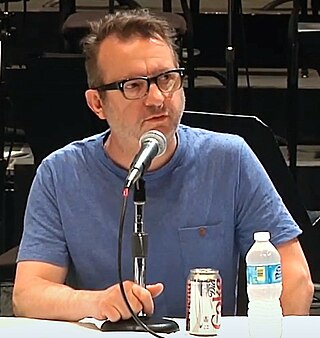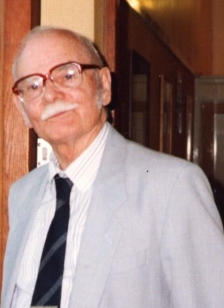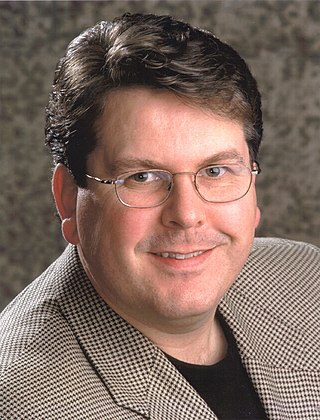Related Research Articles

Mark-Anthony Turnage is an English composer of contemporary classical music.

Alun Hoddinott CBE was a Welsh composer of classical music, one of the first to receive international recognition.
Alan Rawsthorne was a British composer. He was born in Haslingden, Lancashire, and is buried in Thaxted churchyard in Essex.
Gordon Percival Septimus Jacob CBE was an English composer and teacher. He was a professor at the Royal College of Music in London from 1924 until his retirement in 1966, and published four books and many articles about music. As a composer he was prolific: the list of his works totals more than 700, mostly compositions of his own, but a substantial minority of orchestrations and arrangements of other composers' works. Those whose music he orchestrated range from William Byrd to Edward Elgar to Noël Coward.

Grace Mary Williams was a Welsh composer, generally regarded as Wales's most notable female composer, and the first British woman to score a feature film.
Alan Ridout was a British composer and teacher.
William James Mathias CBE was a Welsh composer noted for choral works.
Joseph Horovitz was an Austrian-born British composer and conductor best known for his 1970 pop cantata Captain Noah and his Floating Zoo, which achieved widespread popularity in schools. Horovitz also composed music for television, including the theme music for the Thames Television series Rumpole of the Bailey, and was a prolific composer of ballet, orchestral, brass band, wind band and chamber music. He considered his fifth string quartet (1969) to be his best work.
Walter Sinclair Hartley was an American composer of contemporary classical music.

Ian Parrott was a prolific Anglo-Welsh composer and writer on music. His distinctions included the first prize of the Royal Philharmonic Society for his symphonic poem Luxor, and commissions by the BBC and Yale University, and for many leading British musicians. In 1958 his cor anglais concerto was first performed at Cheltenham Festival, and in 1963 his cello concerto was given by William Pleeth and the Hallé Orchestra – both concertos were conducted by Sir John Barbirolli.

Allan Gilliland is a contemporary Canadian composer.
Bernard (George) Stevens was a British composer who first became known to a wider public when he won a newspaper composition prize for a 'Victory Symphony' in post-war 1946. The broader success was not sustained, but Stevens went on to become a respected composer and teacher at the Royal College of Music, using traditional forms for his compositions while extending his essentially tonal harmonic language towards serialism.

William Lovelock was an English classical composer and pedagogue who spent many years in Australia. He was the first Director of the Queensland Conservatorium of Music in Brisbane, and later became the chief music critic for The Courier-Mail newspaper while developing an independent career as a composer.

Ebenezer Prout was an English musical theorist, writer, music teacher and composer, whose instruction, afterwards embodied in a series of standard works still used today, underpinned the work of many British classical musicians of succeeding generations.
Stefans Grové was a South African composer. Before his death the following assessment was made of him: "He is regarded by many as Africa's greatest living composer, possesses one of the most distinctive compositional voices of our time".
Gary Alan Kulesha is a Canadian composer, pianist, conductor, and educator. Since 1995, he has been Composer Advisor to the Toronto Symphony Orchestra. He has been Composer-in-Residence with the Kitchener-Waterloo Symphony (1988–1992) and the Canadian Opera Company (1993–1995). He was awarded the National Arts Centre Orchestra Composer Award in 2002.
Arthur Eckersley Butterworth, was an English composer, conductor, trumpeter and teacher.
William (Willy) Ostijn, also seen as Ostyn, was a classical Belgian composer of the 20th century.
Philip Sawyers is a British composer of orchestral and chamber music, including six symphonies.
References
- ↑ Greenall, Matthew (2001). "Kelly, Bryan (George)". Grove Music Online (8th ed.). Oxford University Press. doi:10.1093/gmo/9781561592630.article.14854. ISBN 978-1-56159-263-0.(subscription required)
- ↑ Howes, Frank (September 1967). "Bryan Kelly". The Musical Times . 108 (1495): 801–804. doi:10.2307/952489. JSTOR 952489.
- ↑ Biography at the British Music Collection
- ↑
- Kennedy, Michael (2006), The Oxford Dictionary of Music ISBN 0-19-861459-4
- ↑ Recorded by the Choir of St John’s College, Cambridge on Magnificat 3, Signum Classics SIGCD742 (2023)
- ↑ "Bandstand BBC Radio 3 Monday 9 September 1974 17:10", Radio Times , issue 2652, 7 September 1974, p. 36 – via BBC Genome Project
- ↑ "Kelly, Bryan: Whodunnit. Suite for Trumpet and Piano", Stainer & Bell
- ↑ Kelly: Orchestral Music, Vol. 2,, Heritage HTG CD180 (2020), reviewed at MusicWeb International
- ↑ Priory PRCD755 (2001)
- ↑ Kelly, Symphony No. 1 on YouTube